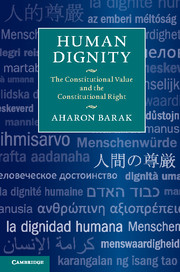Book contents
- Frontmatter
- Contents
- Preface
- Acknowledgements
- Table of Cases
- Part I Fundamental concepts and sources
- Part II Human dignity as a constitutional value
- Part III Human dignity as a constitutional right
- 8 Recognition of the constitutional right to human dignity and its content
- 9 Human dignity as a framework right (mother-right)
- 10 The area covered by the right to human dignity
- Part IV Human dignity in comparative law
- Bibliography
- Index
- References
8 - Recognition of the constitutional right to human dignity and its content
Published online by Cambridge University Press: 05 February 2015
- Frontmatter
- Contents
- Preface
- Acknowledgements
- Table of Cases
- Part I Fundamental concepts and sources
- Part II Human dignity as a constitutional value
- Part III Human dignity as a constitutional right
- 8 Recognition of the constitutional right to human dignity and its content
- 9 Human dignity as a framework right (mother-right)
- 10 The area covered by the right to human dignity
- Part IV Human dignity in comparative law
- Bibliography
- Index
- References
Summary
Express recognition of a constitutional right to human dignity
Human dignity has a long history as a subject of theological and philosophical analysis, but a short history as a constitutional value. Its history as a constitutional right is even shorter. It appears that human dignity was first recognized as a right in the Constitution of Finland (1919). Only after the Second World War did the trend of recognizing human dignity as a constitutional right begin. The German Basic Law (1949) was the first to recognize an independent, express constitutional right to human dignity. After this came many constitutions, including the Constitution of Colombia (1991), Israel’s Basic Law: Human Dignity and Liberty (1992), the Constitution of Russia (1993), the Constitution of South Africa (1996), the Constitution of Poland (1997), and the Constitution of Switzerland (1999). It can therefore be said that, in the second half of the twentieth century, a human dignity revolution took place. The catalyst for this revolution was the violations of human dignity that took place during the Second World War, predominantly the Holocaust of the Jewish people. In a considerable number of constitutions, human dignity is therefore both a constitutional value and a constitutional right. Justice O’Regan discussed this in a South African case:
The value of dignity in our Constitutional framework cannot therefore be doubted. The Constitution asserts dignity to contradict our past in which human dignity for black South Africans was routinely and cruelly denied. It asserts it too to inform the future, to invest in our democracy respect for the intrinsic worth of all human beings. Human dignity therefore informs constitutional adjudication and interpretation at a range of levels. It is a value that informs the interpretation of many, possibly all, other rights. This Court has already acknowledged the importance of the constitutional value of dignity in interpreting rights such as the right to equality, the right not to be punished in a cruel, inhuman or degrading way, and the right to life. Human dignity is also a constitutional value that is of central significance in the limitations analysis. Section 10, however, makes it plain that dignity is not only a value fundamental to our Constitution, it is a justiciable and enforceable right that must be respected and protected.
- Type
- Chapter
- Information
- Human DignityThe Constitutional Value and the Constitutional Right, pp. 139 - 155Publisher: Cambridge University PressPrint publication year: 2015



